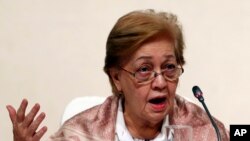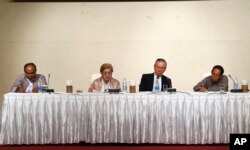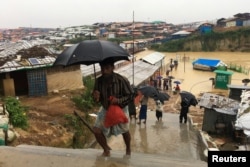Members of a commission established by Myanmar's government to investigate human rights violations in western Rakhine state, where 700,000 members of the Muslim Rohingya minority fled brutal army operations, addressed critics Thursday with a pledge to be impartial.
The Independent Commission of Enquiry held its first formal meeting Thursday in the capital, Naypyitaw, a day after holding talks with the country's leader, State Counsellor Aung San Suu Kyi.
The commission's chairwoman, former Philippine diplomat Rosario Manolo, said at a news conference that the panel would be "independent, impartial and neutral.''
She said it would "seek accountability'' and deliver its recommendations for steps to be taken to ensure peace and stability in the state to Myanmar's president by August 15, 2019. The commission stressed that its investigation would "abide by the laws of Myanmar,'' taking international law into consideration "where applicable'' during its investigation.
The commission was established after rights groups called for the International Criminal Court to investigate alleged abuses by the army against the Rohingya, including murder, mass rape and the destruction of villages. The government — which is not a member of the court — last week rejected any participation in its proceedings, and included the establishment of the commission as one of the reasons there was no justification for the court in The Hague to take up the issue.
The military operation last year followed attacks by Rohingya insurgents on security posts. Hundreds of thousands of Rohingya villagers fled to neighboring Bangladesh, where they are staying in squalid refugee camps while arrangements for them to return to Myanmar proceed at a snail's pace, with continuing concerns that their safety will not be guaranteed.
Myanmar's own probes
Myanmar authorities, including the army, have already conducted their own inquiries and declared their forces free of criminal actions, leading critics to treat the latest government-formed commission as an effort to whitewash what U.N. officials have characterized as ethnic cleaning of the Rohingya community by Buddhist-dominated Myanmar.
Manolo hit back at the skeptics, castigating those who "think maliciously.''
"What I can assure you is we are going to be independent, impartial and neutral, because truth is the only way forward,'' she said.
The three other people on the panel are former Japanese Ambassador to the United Nations Kenzo Oshima and two Myanmar officials.
"I imagine that the government has felt a need to set up a commission such as this one with the participation of foreign members with the desire to bring in more balance, set the record straight,'' Oshima said, referring to reports previously released by both the Myanmar government and international organizations. "There are still some facts and information that have not fully come out.''
The Rohingya have long faced severe discrimination and were the target of violence in 2012 that killed hundreds and drove over 140,000 people — predominantly Rohingya — from their homes to camps for the internally displaced, where most remained until last year's violence.
The government refuses to recognize the Rohingya as a legitimate native ethnic minority, and most Rohingya are denied citizenship and other rights.
The panel said it would travel to Rakhine state, with the military providing security, to talk to affected communities. But it said it had not yet decided whether its members would travel to Bangladesh to talk to refugees in the camps. Leaving the hundreds of thousands of refugees out of their investigations could fuel skepticism over how independent and credible their findings can be.






